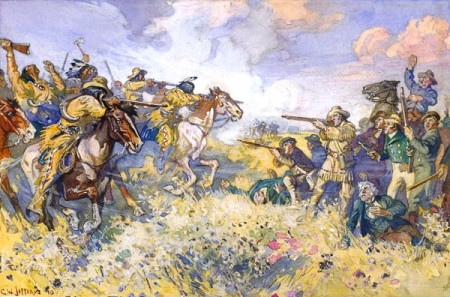A moving response to charges of racism

Whites and natives have been fighting, and living together in Manitoba for centuries. The Métis didn’t always lose either. Fight at Seven Oaks, 1816 by Charles William Jefferys. Source: Library and Archives Canada
Nobody likes being called racist, even though study after study says hardly anyone is free from bias.
The U.S. is deeply mired in debate about policing and the clarion call of “Black lives matter”.
Like it or not, Canada’s equivalent problem involves the treatment of its indigenous people. Personal experience and statistics support assertions that – in their very own land – First Nation, Metis and Inuit have less opportunity and higher-than-average rates of poverty, homelessness, imprisonment and substance addiction.
There’s a long history of programs like residential schools, that help explain how so many lives went off the rails. But it’s often easiest to blame the victims, or pretend the problems don’t exist.
Earlier in January, Maclean’s (one of this country’s most important national magazines) ran this pull-no-punches article: “Welcome to Winnipeg: Where Canada’s racism problem is at its worst“.
Of course racism cannot be easily measured. And it’s not a contest. But the charge stung.
The normal response might be to attack the message and the messenger. Only the new mayor of Winnipeg, Brian Bowman, didn’t go that route.
As recounted by Nancy Macdonald – the same Maclean’s reporter who leveled the initial charge – what happened next was newsworthy in and of itself.
Winnipeg decided to own the problem.
Two-and-a-half hours after he first read the story last week, Bowman convened a press conference. Beside him stood about 30 of the city’s most prominent indigenous and civic leaders, including the chief of police and two university presidents. “Ignorance, hatred, intolerance, racism exist everywhere,” he declared. “Winnipeg has a responsibility right now to turn this ship around and change the way we all relate.” Others, including former national chief of the Assembly of First Nations Ovide Mercredi, who spoke briefly in Cree, and Manitoba Grand Chief Derek Nepinak, expressed similar concerns with the state of racial tension in the city. “I want people to continue to stand up and be strong . . . Talk about the racism that you experience in the stores in this city and across the country,” said Nepinak. “Let’s have this dialogue now, because we are strong enough as a society to overcome these challenges together.”
Anyone interested in making big changes – hard changes – would do well to read the whole article. It’s about creating commonality. About naming the problem. And about taking responsibility (even if your hands were clean) and seeking solutions, together.
I found the responses quite moving. A sign of hope that all sides can be unified to stop doing the same bad things over and over again.
Problems as big as racism can’t be fixed overnight. And racism isn’t just one problem either. It’s often tied to equally thorny issues of income distribution, opportunity, class, education, sexism, sexual violence and substance abuse.
Winnipeg, at least, is willing to stand tall and try. We could all take a lesson from that.

The flag of the City of Winnipeg has this motto: Unum Cum Virtute Multorum
(One with the Strength of Many)
Tags: Brian Bowman, canada, First nations, indigenous rights, racism, social issues, Winnipeg








Good story with some hope in it.
Native Americans and Canadians are often forgot about when it comes to bigotry.
So much of this needs to be addressed with changes to our history books. Whenever I hear somebody say “Slavery ended a long time ago” or “Nobody in my family ever owned slaves” it makes me cringe.
There needs to be more understanding that many people who are alive today grew up in an era of institutionalized, economic racism that didn’t really end in parts of the US until the early 1970’s. The US government was using black men for science experiments (Tuskegee syphilis experiment) until 1972. The Canadian system of ‘Residential Schools” ended about the same time. Then remember that attitudes towards black people in the US and Aboriginal people in Canada didn’t exactly change the moment legal changes went into effect.
It is easy to say that Lincoln ended slavery in the 1860’s and pat ourselves on the back. However the reality is that any black or aboriginal person over the age of 50 lived in a time of legal discrimination, and anyone younger than that grew up with parents who didn’t get a fair shake in life.
Good move in Winnipeg! Thanks for highlighting this.
This is what’s called leadership. Wish we had more of it here.